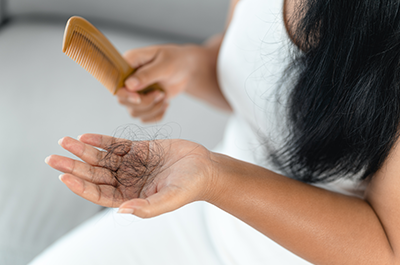It happens to the best of us: you wake up feeling great, but as the day goes on, your stomach protrudes and becomes bloated. It can be incredibly frustrating, especially if it’s a frequent occurrence, and especially if it comes with discomfort and pain.
“Equally frustrating is that there are so many causes of bloat—some being simple fixes and others being much more complicated,” says Carrie Leff, D.O., an internal medicine physician with Henry Ford Health. “What causes one person to bloat might not be the cause of another person’s bloat. There’s not a one-size-fits-all approach to figuring out how to get rid of it. If you’re concerned, the best thing to do is share your concerns with your doctor.”
That said, Dr. Leff shares several common culprits of bloat that you might not have known about:
1. Hormone Fluctuations
Women often complain that they’re bloated before their period. Why? Hormonal changes can cause salt cravings, and salt leads to water retention. Also, rising progesterone levels during the second half of the menstrual cycle can cause constipation, which may improve when menstruation begins and hormone levels fall.
To ease PMS-related bloating, Dr. Leff recommends exercising, limiting salt and caffeine, and drinking lots of water. Using a period tracking app to be aware of the times when you have these symptoms (to understand the cause) can also be helpful.
2. Swallowed Air
If you ever talk while eating, eat too quickly, chew gum, drink carbonated beverages or smoke, your bloat could be caused by swallowed air in the gastrointestinal tract. (It can also lead to flatulence, although usually it’s odorless.)
3. Fake Sugar
“Many people with functional bloating (meaning bloat that’s not due to an underlying condition) can be cured by restricting artificial sweeteners,” says Dr. Leff. “Ease up on diet sodas, ‘light’ juices, and artificial sweetener packets that you mix into coffee or tea. Instead of artificial sugar, I use a little bit of brown granulated sugar in my coffee.” (P.S. High fructose corn syrup can also cause bloating. If you want sugar, it’s usually best to go for the real thing—in small amounts!)
4. Legumes And Cruciferous Veggies
Beans and lentils, along with cruciferous veggies like broccoli, cauliflower, Brussels sprouts, cabbage and kale, can cause bloating because they are more difficult for our bodies to digest. (It doesn’t mean they aren’t good for you—they are!) But if the bloat is bothering you, try eating them in smaller amounts and making substitutes, such as swapping a kale salad for spinach.
5. Small Intestinal Bacterial Overgrowth (SIBO)
SIBO, or small intestinal bacterial overgrowth, occurs when there’s an overgrowth of gut bacteria in the small intestine. It can lead to bloating, stomach pain, malabsorption of food, and other digestive issues. If you suspect you might have SIBO, seeing a functional medicine physician may be helpful. Learn more about SIBO here.
6. Irritable Bowel Syndrome (IBS)
Irritable bowel syndrome is a symptom-diagnosed condition that leads to bloating, diarrhea and constipation. “IBS is a diagnosis of exclusion, meaning all of the testing has failed to reveal any underlying disease and diagnosis,” says Dr. Leff. “The diagnosis is made based upon a pattern of symptoms. Many things (from stress to food) can trigger these symptoms, and triggers are different for every patient.”
7. Food Sensitivities, Allergies And Intolerances
An undiagnosed food sensitivity, allergy, or intolerance can lead to bloating, diarrhea or nausea. (Gluten, dairy, eggs and soy are common foods that people react poorly to.) “If you suspect that a food sensitivity or intolerance is the cause of your bloat, see your doctor and consider a trial elimination diet,” says Dr. Leff.
8. Celiac Disease
Gluten sensitivity and celiac disease are two different issues: celiac disease is an autoimmune condition that damages the lining of the gastrointestinal tract in the small bowel; a non-celiac gluten sensitivity doesn’t cause significant structural damage. Celiac disease not only causes bloating, but stomach pain, nausea, malabsorption of food, constipation, weight loss and fatigue. You can get a blood test, which may indicate that there is a problem, but the diagnosis is made with a biopsy of the first part of the small intestine.
Cutting out gluten is the main method of treatment, however, talk to your doctor before making this change.
9. Gastrointestinal-Related Diseases
More significant diseases can cause bloating. “If you’re experiencing changes in your stool, blood in your stool, weight loss, an increasing abdominal girth that's not going away, or if you’re unable to eat, you should talk to your doctor,” says Dr. Leff. “However, most of the bloating we see is likely related to what you’re eating and how you’re eating it.”
So, how to change the way you eat? Dr. Leff recommends starting with mindful eating. “Put down your fork in between each bite and don’t put more food in your mouth until you have finished chewing,” she says. “Give your body time to feel full. Eat when you’re hungry, not when you’re tired, thirsty or bored. If you’re not sure whether you’re thirsty or hungry—since the same part of the brain controls thirst and hunger—drink a glass of water, wait five to ten minutes and then if you’re still hungry, eat. You don’t have to starve, just eat with intention.”
To find a doctor at Henry Ford, visit henryford.com or call 1-800-HENRYFORD (436-7936).
Dr. Carrie Leff is an internist, pediatrician and a certified menopause provider with Henry Ford Health. She sees patients at Henry Ford Medical Center in Bloomfield Township.



